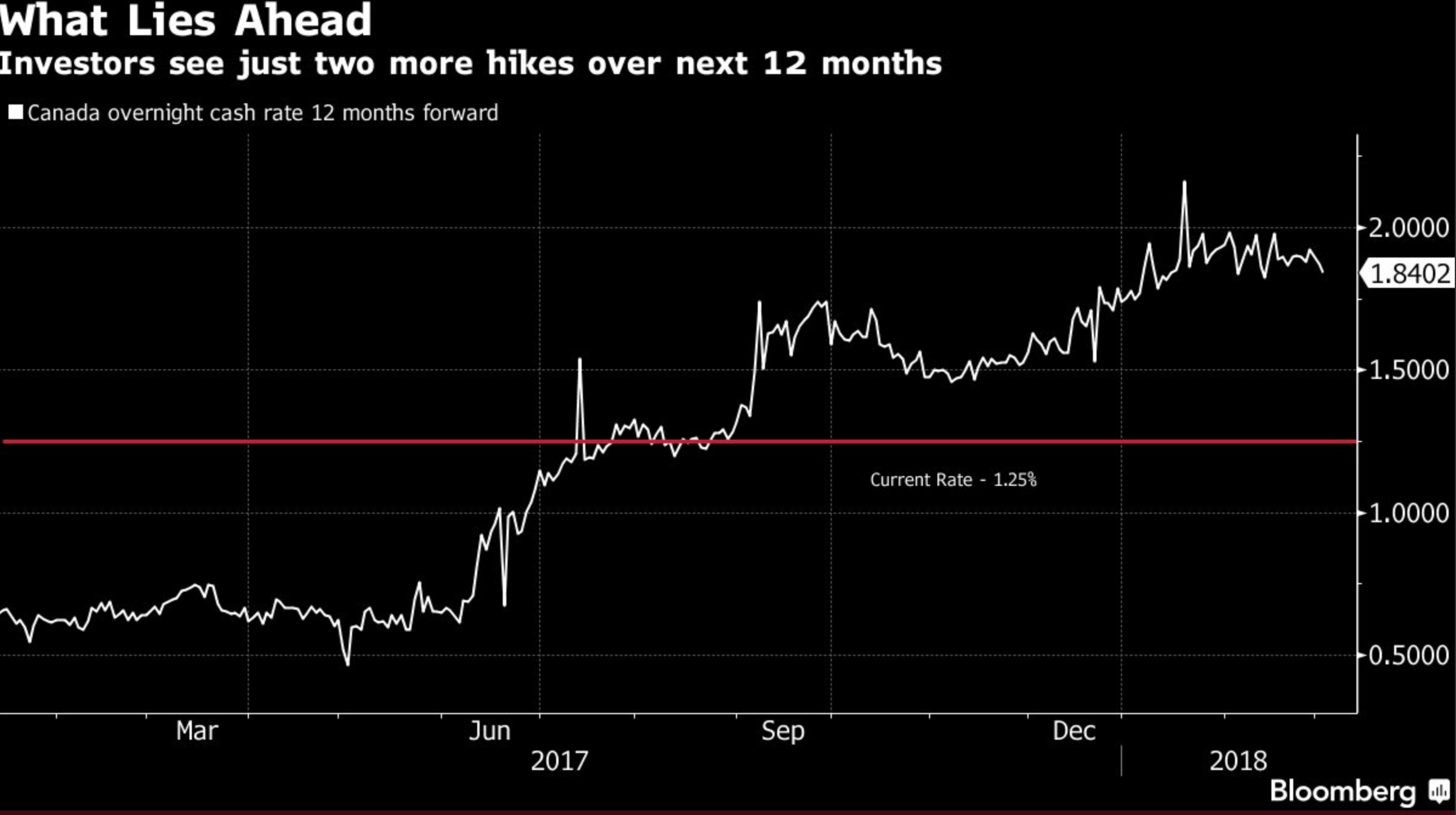Your interest rate burden got no heavier today. The Bank of Canada gave floating-rate borrowers a breather by leaving its policy rate at 1.25%.
Holding the Bank back were these concerns:
- NAFTA “uncertainty”
- “Slower than expected” Q4 GDP growth
- Weaker than expected “wage growth”
- Canadians’ “sensitivity to higher interest rates”
- Household credit growth that’s dropped for “three consecutive months.”
Inflation, which can be jet fuel for higher rates, has ticked higher for months but is still below the BoC’s 2% target. Inflation expectations, which are even more important, also generally point to 2% inflation or less.
The Bank of Canada’s next rate decision is April 18. Derivatives prices imply less than a 1-in-3 chance the BoC will hike rates at that meeting. But few expect 2018’s economy to be as robust as last year’s 3% growth, so that should cap rates to some extent.
All in all, the market thinks we’ll get two more hikes this year, but wildcards like Trump’s trade policies could change that with the stroke of a pen. We’ve started seeing economists ratchet down their 2018 hike expectations from 3 to 2 to 1 after today’s report.
As a mortgagor, today’s news shouldn’t change your plans. The main fixed or variable rate decision criteria remain as they were. And Canada’s lowest variable rates are still:
- Prime – 1.34% for insured mortgages (effective rate)
- Prime – 1.20% for mortgages with 65% loan-to-value or less
- Prime – 0.86% for mortgages with 65.01 to 80% loan-to-value
- Prime – 0.78% for refinances.
With rates like these, variable-rate borrowers are getting a big head start in a variable, versus common 3.39% five-year fixed rates. The Bank of Canada would have to hike at least four more times for you to pay less in that fixed rate. And that doesn’t factor in other variable benefits, like the lower penalty cost, option to lock in later and lower payment.
So if you’re in a variable, stay variable.
If you’re a strong borrower hunting for a new mortgage, at least consider variable.

 log in
log in
 Your interest rate burden got no heavier today. The
Your interest rate burden got no heavier today. The 
10 Comments
Do banks make the same from a customer choosing a fixed vs variable rate mortgage? Or is there one mortgage vs the other where they have more incentive to steer a customer towards?
Lender profit differs based on term, rate, funding costs (e.g., market rates, spreads, whether the mortgage is insured, whether it’s securitized, etc.), channel (retail or broker) and borrower qualifications, among other things. So it’s tough to generalize.
That said, you will see banks shift their pricing and promotions when they want to steer more people into one specific term.
2yr fixed terms are still my favorite. I’m seeing rates of 2-2.05%, vs 2.7% for 5yr variable. Both will use the same 5.14% qualifying rate, while a 5yr fixed with a qualifying rate of 5.4% will give you slightly less buying power on top of the higher rate.
To Ralph:
2.00% to 2.05% two year fixed rates? No way. No chance.
Show us a screenshot of these rates.
They don’t exist.
Typo. 2yr @3.0-3.05%
I’m having trouble wrapping my head around the relationship between the size of the rate discount and the condition of the mortgage. In other words, why does refinancing of an existing loan attract the least amount of discount?
Hey Dennis,
Two reasons:
1) Refinances can no longer be insured. That means their funding cost is now higher for most lenders than it was before Nov. 2016. Refis are particularly more expensive for bank competitors who rely on securitization. Because they can no longer insure refis, they can no longer securitize them. Hence, they have to sell refis to big aggregators (e.g., banks, their competitors) at inferior terms. Hence, there’s been a noticeable loss of price competition in the refi market.
3) Statistically, refis are slightly more risky and are generally priced accordingly.
When will the Bank of Canada review interest rates again? Shall I change my variable rate to a fixed one now? Or should I wait?
You shall not. (Unless you shall.)
Sorry Urpicg, we can’t time when you should lock in. If we were that smart, we wouldn’t be here.
P.S. April 18 is the next Bank of Canada rate meeting.